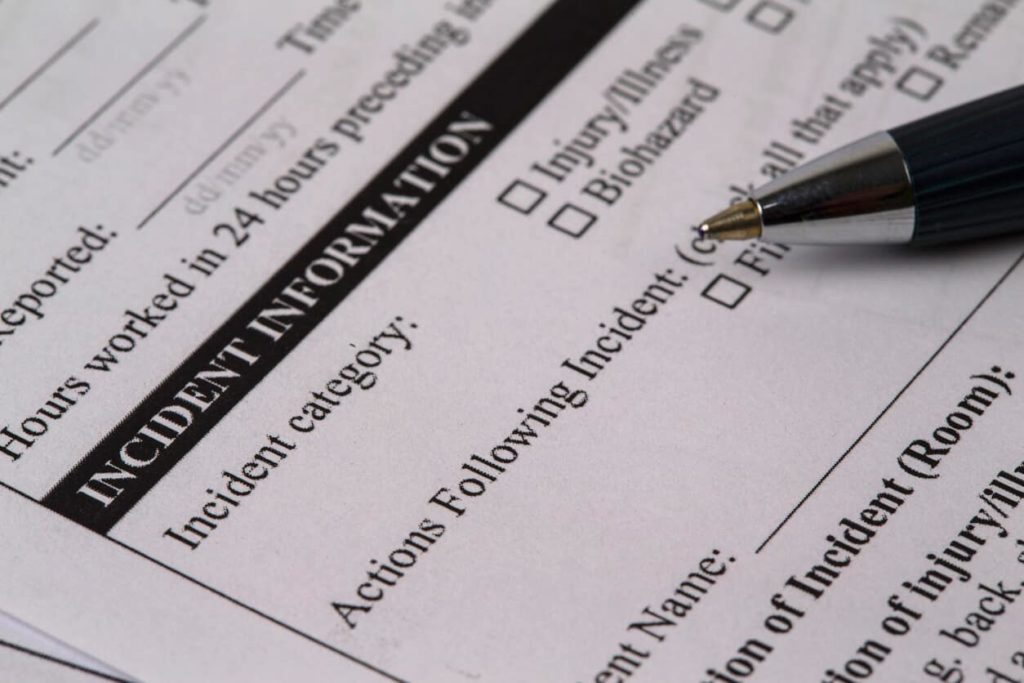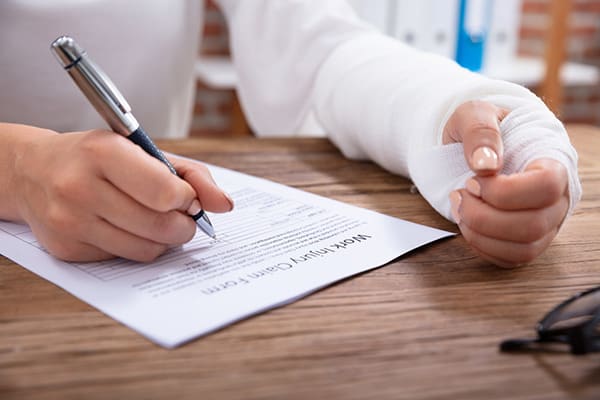Colorado Injured Worker Guide
If you have been injured on the job, Colorado workers’ compensation laws allow you to recover the benefits you need to pay your medical and everyday bills. You have legal rights and options following a workplace injury and the workers’ comp attorneys at Bachus & Schanker are here to help.
Bachus & Schanker Wins – Over $1 Billion Recovered
- What is workers' comp?
- Workers' compensation vs. civil claims
- How does workers' comp work in Colorado?
- What happens if my employer denies my claim?
- When will workers' comp offer a settlement?
- What if my employer does not have workers' compensation insurance?
- What not to do while on workers' comp
- Speak with a workers' comp attorney at Bachus & Schanker
- Related Workers Compensation Resources
- You Deserve Fair Compensation
What is workers’ comp?
Workers’ compensation is insurance that pays out wage replacement benefits to workers who have been injured on the job. Over 18,600 claims have been filed between January and August 2023. Over $1.5 billion in total compensation and medical bills have been paid.
All businesses with employees operating in the state are required to carry workers’ compensation insurance. This insurance provides medical and lost wage benefits to workers who are injured on the job. The cost of workers’ compensation is a critical aspect for Colorado employees and cannot be passed on to employees as it helps to protect them in the event of an injury.
Workers’ compensation vs. civil claims
Workers’ compensation takes the place of bringing a claim against an employer for an injury on the job. This level of immunity keeps business owners from suffering severe losses in the event of an accident; however, there are limitations to what the worker can recover after filing a workers’ compensation claim.
Colorado workers’ compensation will pay a percentage of a workers’ weekly wage up to the maximum benefit amount. Some rules go into calculating an average weekly wage. If an employee can still work in some capacity, those benefits are still paid out, but at a reduced amount.
There may be instances where you can file a workers’ compensation claim and a civil claim at the same time; however, this is typically not the case. If you’re driving for work and are injured by another driver, you may be able to claim workers’ compensation benefits while also seeking a civil claim against the driver who injured you.
In some instances, if your employer was involved in causing the injury, you may potentially be able to pursue a lawsuit against them as well. However, workers’ compensation exists to help protect business owners from such lawsuits.
Working with an experienced Colorado workers’ compensation lawyer can help you determine what options you may have in your case and how you can recover additional damages to help cover your financial losses.
How does workers’ comp work in Colorado?
If you’ve suffered an injury while at work, you need to act quickly to submit a workers’ compensation claim and collect the benefits you’re entitled to. The Colorado’s Injured Workers’ Guide explains what you need to do if you’ve suffered an injury at work.
Seek emergency care
If your workplace injury rises to the level of an emergency, it’s important to seek emergency medical care immediately. If your injury is severe, you should not move. Wait until an ambulance and medical services arrive. Getting immediate emergency medical care can help reduce the extent of your injuries and can be lifesaving.
Notify your employer of your injury
Colorado state law requires employees injured on the job to report their injury to their employer within ten days of their injury. Waiting beyond this window of time may result in a denial of your claim or your ability to file a claim.
Continue medical treatment
If you’re experiencing continued pain or medical issues related to your injury, it’s important to keep up with your medical care. Work with a medical provider from your designated provider list. This is a list that your employer will provide, and it should include up to four approved medical providers or clinics.
If your employer does not provide you with this list within seven business days after you’ve notified them of your injury, you may choose your own doctor. Keep a detailed record of your medical services.
Filing a workers’ compensation claim
Claimants have up to two years following the date of their injury to file a workers’ compensation claim. You can file your claim by reporting your injury directly to the Division of Workers’ Compensation.
It’s important to note that your immigration status is not considered and does not play a role in determining workers’ compensation benefits. All employees in Colorado have the right to seek workers’ compensation benefits if they have been injured on the job.
Claim liability
Once you file a claim with the Division of Workers’ Compensation, the respondent (the insurance carrier, third-party administrator, employer, and/or self-insured employer) will grant or deny the claim through a Notice of Contest. This notice will be filed 20 days from when your original workers’ compensation claim was filed.
If the respondent denies liability, the claim will automatically close if you do nothing for the next two years. You will have the option to apply for an expedited hearing or request a standard hearing to contest the liability denial. At this stage, the expertise of an experienced Colorado workers’ comp attorney can help you navigate the details of your claim.
Final Admission of Liability
If your claim is not denied, and you’ve been continuing your medical care, the respondents will file a Final Admission 30 days after you have reached your maximum medical improvement (MMI). MMI marks the point where your injuries have improved as much as possible and ends your ongoing wage loss benefits. The MMI can also trigger payment of permanent disability.
When the respondent files a Final Admission, you’ll either be able to agree with the Final Admission and your case closes, or you’ll be able to disagree. Agreeing with the claim closure does not impact the payment you are entitled to. If you disagree with the Final Admission of Liability, you must do so within 30 days from the date of the Final Admission.
You may have disagreements with awarded benefits amounts, settlement amount, your MMI/impairment rating, or other details of your case. If you disagree with the Final Admission of Liability you’ll either have to file for a division independent medical examination or file an application for a hearing. A workers’ compensation lawyer can help you craft a denial that is supported by evidence.
What happens if my employer denies my claim?
If your employer or their insurance denies your workers’ compensation claim, you still have options. You can challenge their decision through an appeal, and you can contest your entitlement to benefits. If your employer offers a compensation amount that you don’t agree with, you can challenge that amount as well.
Working with an experienced workers’ compensation lawyer allows you to have comprehensive legal representation to strengthen your case. Working with a team like the experts at Bachus & Schanker means you’ll have legal experts well-versed in investigating, negotiating, and presenting your case.
When will workers’ comp offer a settlement?
After you file a workers’ compensation claim, you may be offered a settlement at any point during the process. However, the settlement is typically awarded after you reach your MMI. If you disagree with the insurance company’s determination of your MMI, you can dispute settlement amounts by working with a workers’ comp lawyer.
What if my employer does not have workers’ compensation insurance?
Despite all Colorado employers being required to carry workers’ compensation insurance, not all businesses comply. If your employer did not carry this coverage at the time of your injury, you can still file a claim with the Division of Workers’ Compensation.
The division offers a Colorado Uninsured Employer Fund which offers assistance to individuals in such circumstances. To qualify for this fund, you’ll need to file a WC15 and attend a hearing where a judge’s order will allow you to collect workers’ compensation benefits.
What not to do while on workers’ comp
Throughout the workers’ comp process, it’s important to know about your rights and options, but it’s equally important to understand your responsibilities.
- Do not miss your doctor’s appointments
- Do not miss deadlines associated with the claims process
- Ensure that the Division of Workers’ Compensation has your correct contact information. Missing important information, notices, and deadlines because the division’s contact information for you is not up to date can hinder your entitlement to benefits.
- Do not visit with doctors not listed on the designated provider list
- Do not sign anything until you have had a Colorado workers comp attorney look it over
Speak with a workers’ comp attorney at Bachus & Schanker

The experienced workers’ comp attorneys at Bachus & Schanker have a deep understanding of Colorado’s workers’ compensation laws. Get the benefits you deserve and learn about your rights and options when you work with our team.
Sources:
Colorado Uninsured Employer Fund. (2023).
Colorado’s Injured Worker’s Guide. (2023).
Colorado’s Worker’s Compensation Act. (2023).
File a Workers’ Compensation Claim. (2023).
Office of Workers’ Compensation Programs (OWCP) EEOICP Program Statistics. (2023).
WC15 – Workers Claim for Compensation. (2023).
Related Workers Compensation Resources
You Deserve Fair Compensation
Don’t let the insurance companies intimidate you into accepting less than you deserve. We’re ready to fight for you.













